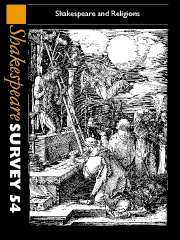Book contents
- Frontmatter
- Shakespeare and the Protestant Mind
- Divine [ ]sences
- ‘An alien people clutching their Gods’?: Shakespeare’s Ancient Religions
- ‘He drew the Liturgy, and framed the rites’: The Changing Role of Religious Disposition in Shakespeare's Reception
- Jonson, Shakespeare, and the Religion of Players
- The Bard and Ireland: Shakespeare’s Protestantism as Politics in Disguise
- ‘Every Good Gift From Above’ Archbishop Trench’s Tercentenary Sermon
- Anthony Munday and The Merchant of Venice
- Perfect Answers: Religious Inquisition, Falstaffian Wit
- When Suicide Becomes an Act of Honour: Julius Caesar and Hamlet in Late Nineteenth-Century Japan
- Religion in Arden
- A Wedding and Four Funerals: Conjunction and Commemoration in Hamlet
- Between Religion and Ideology: Some Russian Hamlets of the Twentieth Century
- Of Shadows and Stones: Revering and Translating ‘the Word’ Shakespeare in Mexico
- Ministers, Magistrates and the Production of ‘Order’ in Measure for Measure
- The Hebrew Who Turned Christian: The First Translator of Shakespeare into the Holy Tongue
- Shakespeare and English Performance Style: The European Context
- All At Sea: Water, Syntax, and Character Dissolution in Shakespeare
- King John, König Johann: War and Peace
- The Tempest’s Forgotten Exile
- The Old Lady, or All is Not True
- Shakespeare Performances in England, 2000
- Professional Shakespeare Productions in the British Isles January-December 1999
- The Year's Contributions to Shakespearian Study 1 Critical Studies
- 2 Shakespeare’s Life, Times, and Stage
- 3 Editions and Textual Studies
- Books Received
- Index
When Suicide Becomes an Act of Honour: Julius Caesar and Hamlet in Late Nineteenth-Century Japan
Published online by Cambridge University Press: 28 March 2007
- Frontmatter
- Shakespeare and the Protestant Mind
- Divine [ ]sences
- ‘An alien people clutching their Gods’?: Shakespeare’s Ancient Religions
- ‘He drew the Liturgy, and framed the rites’: The Changing Role of Religious Disposition in Shakespeare's Reception
- Jonson, Shakespeare, and the Religion of Players
- The Bard and Ireland: Shakespeare’s Protestantism as Politics in Disguise
- ‘Every Good Gift From Above’ Archbishop Trench’s Tercentenary Sermon
- Anthony Munday and The Merchant of Venice
- Perfect Answers: Religious Inquisition, Falstaffian Wit
- When Suicide Becomes an Act of Honour: Julius Caesar and Hamlet in Late Nineteenth-Century Japan
- Religion in Arden
- A Wedding and Four Funerals: Conjunction and Commemoration in Hamlet
- Between Religion and Ideology: Some Russian Hamlets of the Twentieth Century
- Of Shadows and Stones: Revering and Translating ‘the Word’ Shakespeare in Mexico
- Ministers, Magistrates and the Production of ‘Order’ in Measure for Measure
- The Hebrew Who Turned Christian: The First Translator of Shakespeare into the Holy Tongue
- Shakespeare and English Performance Style: The European Context
- All At Sea: Water, Syntax, and Character Dissolution in Shakespeare
- King John, König Johann: War and Peace
- The Tempest’s Forgotten Exile
- The Old Lady, or All is Not True
- Shakespeare Performances in England, 2000
- Professional Shakespeare Productions in the British Isles January-December 1999
- The Year's Contributions to Shakespearian Study 1 Critical Studies
- 2 Shakespeare’s Life, Times, and Stage
- 3 Editions and Textual Studies
- Books Received
- Index
Summary
I wonder how widely it is realized that of all the Shakespearian characters who either kill themselves or think of killing themselves relatively few are overtly conscious of the sinfulness of the act. Both Romeo and Juliet are almost jubilant when they end their lives, and the same is certainly true about Pyramus and Thisbe, who can be interpreted as burlesque versions of the star-crossed lovers. Gloucester in King Lear is far from elated when he tries to kill himself, and his affliction seems to be simply too great to allow him time to consider the religious implications of the act he is about to perform. We are not quite certain about the state of mind Lady Macbeth and Goneril are in when they commit suicide as their deaths are not enacted on stage but only briefly reported to the audience. Still it would be safe to assume that their sense of guilt is far more overwhelming than any scruples they might have. We had better look elsewhere to encounter a Shakespearian character who thinks twice before proceeding to the act of fatal self-destruction.
One notable case is of course the central character of Hamlet with his reference to the everlasting fixing his canon against self-slaughter. Later in the play the priest talks disparagingly about Ophelia's death which he says is 'doubtful', but his remark does not really come as a surprise since he is professionally expected to be critical about suicide, and in any case Laertes's possibly sacrilegious attack against him might counterbalance the attitude the man holds.
- Type
- Chapter
- Information
- Shakespeare Survey , pp. 108 - 114Publisher: Cambridge University PressPrint publication year: 2001



